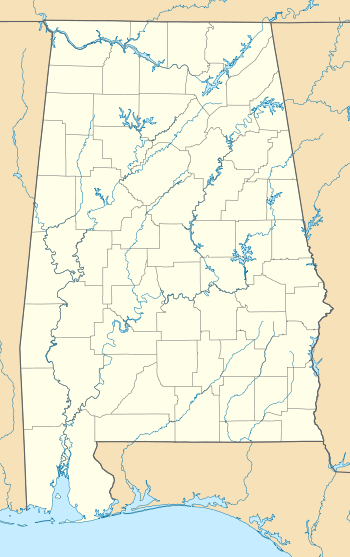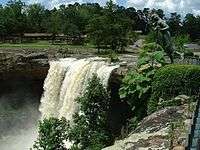Noccalula Falls Park
| Noccalula Falls Park | |
|---|---|
|
Noccalula Falls | |
 Location of Noccalula Falls in Alabama | |
| Type | City park |
| Location | Gadsden, Alabama |
| Coordinates | 34°2′29.364″N 86°1′16.608″W / 34.04149000°N 86.02128000°WCoordinates: 34°2′29.364″N 86°1′16.608″W / 34.04149000°N 86.02128000°W |
| Area | 250 acres (100 ha) |
| Operated by | City of Gadsden Parks & Recreation |
Noccalula Falls Park is a 250-acre (101-ha) public park located in Gadsden, Alabama (USA).
The falls are located on land once owned by R.A. Mitchell, who gave the site to the city of Gadsden, so that the area could be improved, and the public could enjoy the falls. R.A. Mitchell Elementary School, named in his honor, is located across the street from the falls. The main feature of the park is a notable 90-foot (27-m) waterfall with a gorge trail winding through its basin and past caves, an aboriginal fort, an abandoned dam, pioneer homestead, and Civil War carvings.[1] The park also features a petting zoo, mini-golf course, the Gilliland-Reese Covered Bridge (built 1899) and a replica 1863 C. P. Huntington train ride. It was listed on the Alabama Register of Landmarks and Heritage on May 12, 1976.[2]
The falls drop itself has been run successfully in whitewater kayaks at least once in late November 2011 by three expert kayakers.[3] The water level was unusually high permitting a deep enough pool to form at the base of the falls. Ordinary water levels would not form enough of a pool to consider an attempt to run the drop.
The Noccalula Falls Botanical Gardens is an extensive botanical garden displaying over 25,000 azaleas.
Statue and Legend
.jpg)
Noccalula Falls, which drops into the Black Creek ravine, is marked with a bronze statue of a young Cherokee woman, Noccalula, who, according to local legends, plunged to her death after being ordered by her father to marry a man she did not love.[1] The bronze statue of Noccalula was, at the time of its creation, the first statue of a person jumping off a cliff. This legend is much similar to Wisconsin's Winona story. The bronze used in the statue was made from pennies collected from local school children in the mid-1960s.
Although no peer-reviewed historic journals have evaluated the veracity of the legend, at least one independent researcher has published evidence suggesting that the story is apocryphal.[4]
See also
References
- 1 2 "The World's Longest Yard Sale", Peter Greenberg, AARP Magazine, May 2009, webpage: AARP-yardsale.
- ↑ "The Alabama Register of Landmarks & Heritage". preserveala.org. Alabama Historical Commission. May 31, 2011. Archived from the original (PDF) on June 6, 2011. Retrieved June 6, 2011.
- ↑ http://blog.al.com/montgomery/2011/12/must-see-video_kayakers_go_ove.html
- ↑ "The Truth About Noccalula Falls", February 2011, webpage:
